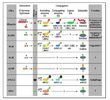ISG15 Rabbit Polyclonal Antibody
Specifications
| Product Data | |
| Applications | Assay, ELISA, WB |
| Recommended Dilution | This purified polyclonal antibody reacts with human ISG15 by ELISA and Western blot. This antibody using the specified conditions may recognize other prominent intrinsic bands (UBLs or conjugates). Other intrinsic bands are readily detectable at lower dilutions. An 18.5 kDa band corresponding to human ISG15 is detected. Most human cell lysates can be used as a positive control without induction or stimulation. Recommended dilutions: ELISA 1:2,000 - 1:10,000 Western blot 1:200 - 1:1,000. Although not tested, this antibody is likely functional in immunohistochemistry and immunoprecipitation. |
| Reactivities | Human |
| Host | Rabbit |
| Clonality | Polyclonal |
| Immunogen | Recombinant human ISG15 protein |
| Specificity | Assay by immunoelectrophoresis resulted in a single precipitin arc against anti-Rabbit Serum. |
| Formulation | 0.02 M Potassium Phosphate, 0.15 M Sodium Chloride, pH 7.2, containing 0.01% sodium azide State: Purified State: Lyophilized IgG fraction |
| Reconstitution Method | Restore with 0.1 ml of deionized water or equivalent. |
| Concentration | 5.0 mg/ml (by UV absorbance at 280 nm) |
| Purification | A multi-step process which includes delipidation, salt fractionation and ion exchange chromatography followed by extensive dialysis against the buffer stated below |
| Database Link | |
| Background | Ubiquitin-like proteins fall into two classes: the first class, ubiquitin-like modifiers (UBLs) function as modifiers in a manner analogous to that of ubiquitin. Examples of UBLs are SUMO, Rub1 (also called Nedd8), Apg8 and Apg12. Proteins of the second class include parkin, RAD23 and DSK2, are designated ubiquitin-domain proteins (UDPs). These proteins contain domains that are related to ubiquitin but are otherwise unrelated to each other. In contrast to UBLs, UDPs are not conjugated to other proteins. ISG15 (Interferon Stimulating Gene-15) shows no amino acid sequence homology to cytokines and is synthesized as a precursor that is activated through processing by a thiol protease. ISG15 is secreted by monocytes and lymphocytes. Synthesis is induced in response to IFN-α or IFN-β or IFN-∞, but not IFN-γ. ISG15 expression is induced also by overexpression of some interferon regulatory factors that have been shown to play a role in the transcriptional regulation of IFN genes. ISG15 is secreted also by cell lines of monocyte (U937 cell line), T-lymphocyte, B-lymphocyte (DAUDI cells), human fibroblasts, and epithelial origins. The induction of terminal differentiation in human melanoma cells is associated, among other things, with alterations in the expression of ISG15. Intracellularly ISG15 has been shown to function as a ubiquitin homologue. It is known also as UCRP (ubiquitin cross-reactive protein). Serpin 2a (spi2a), a member of the serine protease inhibitor (serpin) protein family that is highly induced in macrophages during bacillus Calmette-Guerin infection has been shown to bind ISG15. ISG15 has been shown to modulate immune cell function. It possesses activities of cytokines and induces production of IFN-γ. It enhances proliferation and functions of natural killer and LAK cells. |
| Synonyms | UCRP |
| Reference Data | |
Documents
| Product Manuals |
| FAQs |
| SDS |
{0} Product Review(s)
0 Product Review(s)
Submit review
Be the first one to submit a review
Product Citations
*Delivery time may vary from web posted schedule. Occasional delays may occur due to unforeseen
complexities in the preparation of your product. International customers may expect an additional 1-2 weeks
in shipping.






























































































































































































































































 Germany
Germany
 Japan
Japan
 United Kingdom
United Kingdom
 China
China




